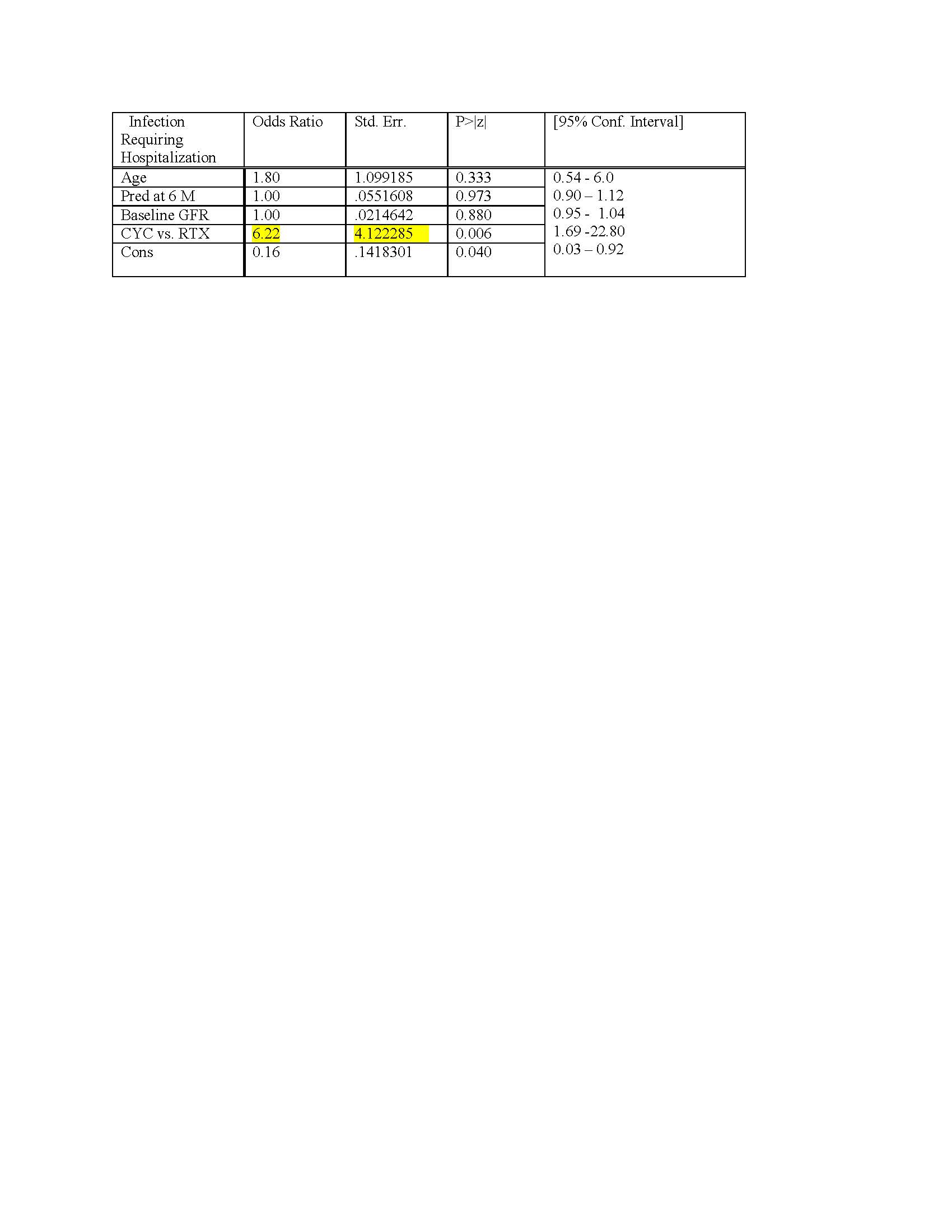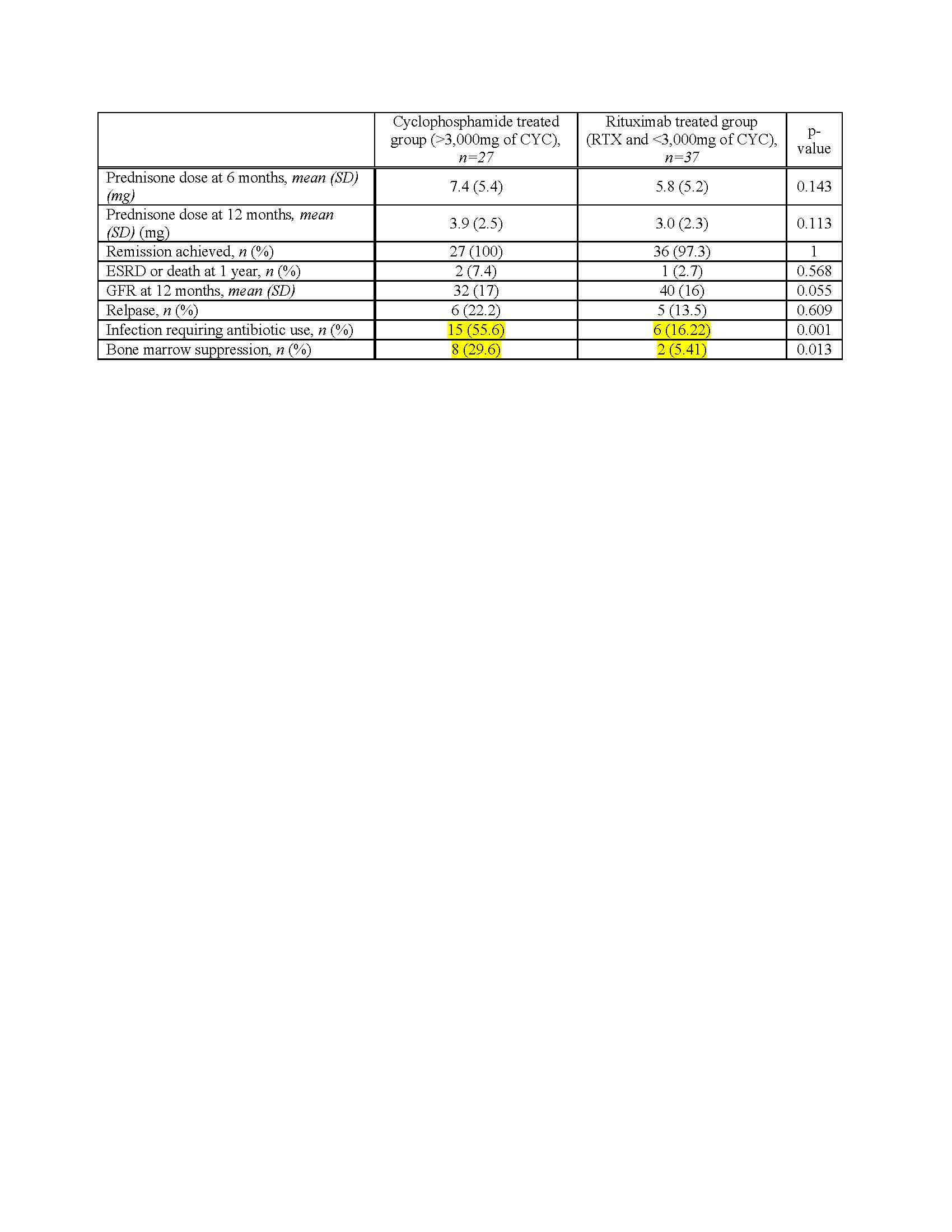Session Information
Session Type: Poster Session (Tuesday)
Session Time: 9:00AM-11:00AM
Background/Purpose: Induction regimens using either cyclophosphamide (CYC) or rituximab (RTX) have been shown to have similar efficacy and similar rates of adverse events in randomized trials of patients with a mean age of 54 yrs. Little is known about outcomes among older patients with ANCA-associated glomerulonephritis (ANCA GN) receiving such therapies. This study aimed to compare these outcomes in elderly ANCA GN on the basis of induction therapy regimen (CYC vs RTX).
Methods: Patients, ages 60 and above, diagnosed with ANCA GN clinically and histologically from 2004 to 2018 were retrospectively identified. Baseline characteristics and outcomes across several clinical parameters were recorded and compared between groups using t-test, Mann-Whitney-U test and Fisher’s exact test for significance as appropriate.
Results: Among a cohort of 64 patients with ANCA GN with a mean (SD) age of 75 (+7) years at diagnosis, patients treated with CYC (n = 27) compared to those treated with RTX (n = 37) had a higher peak serum creatinine at baseline (4.7 mg/dl vs. 2.5 mg/dl, p = 0.0005), higher hemodialysis dependence pre-renal biopsy (35% versus 2%, p = 0.01), and higher use of plasmapheresis (33% vs. 4%, p = 0.02). The mean GFR at 12 months was higher in rituximab patients (40 vs. 32, p=0.05). There were no statistically significant differences between the two groups in prednisone dose at 6 months (7 mg/day vs. 6 mg/day, p = 0.14) or at 12 months ( 4 mg/day vs. 3mg/day, p = 0.11), disease remission (100% vs. 97%, p = 1.0), combined outcome of end stage renal disease and/or death at 12 months (7% vs. 3%, p = 0.57), or disease relapse (22% vs. 13%, p = 0.61) (Table 1). Patients treated with CYC had a higher number of patients with bone marrow suppression (30% vs. 5%, p = 0.01) and developed an infection requiring hospitalization at 12 M of follow-up compared to RTX treated group (56% versus 16%, p = 0.001). Additionally, after adjustment for age, GFR and prednisone dose at 6 months, CYC use was associated with higher infection risk [aOR 6.22, 95% CI (1.70-22.80)] (Table 2).
Conclusion: CYC and RTX appear to be effective in remission induction in elderly patients with ANCA GN. Use of CYC was associated with a higher risk of bone marrow suppression and infections requiring hospitalization compared to RTX. More information is needed on the comparative safety of induction therapy strategies in elderly ANCA GN patients.

Infection Requiring Hospitalization Table
To cite this abstract in AMA style:
Hopkins A, Chu S, Seo P, Gapud E, Antiochos B, Eid S, Liebowitz J, Geetha D. Efficacy of Remission Induction Regimens in Elderly Patients with ANCA-Associated Glomerulonephritis [abstract]. Arthritis Rheumatol. 2019; 71 (suppl 10). https://acrabstracts.org/abstract/efficacy-of-remission-induction-regimens-in-elderly-patients-with-anca-associated-glomerulonephritis/. Accessed .« Back to 2019 ACR/ARP Annual Meeting
ACR Meeting Abstracts - https://acrabstracts.org/abstract/efficacy-of-remission-induction-regimens-in-elderly-patients-with-anca-associated-glomerulonephritis/

